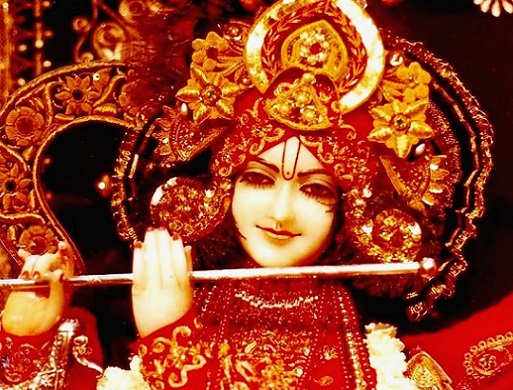(Madan Mohan, the Enchanter of Cupid—click to enlarge)
"The Vedic hymn which is known as Kamagayatri describes the Face of Krishna as the king of all moons. In metaphorical language there are many different moons, and they are all one in Krishna—the moon of the mouth, the moon of the cheeks, the moon-spots of sandalwood pulp, the beauty moon of the fingertips of His hand, and the tip of His toes—in this way there are twenty-four and a half moons, and Krishna is the central figure of all these different kinds of moons.
The dancing movement of Krishna's earrings, eyes, and eyebrows are very attractive to the damsels of Vraja. Activities in devotional service increase the sense of devotional service. What else is there for two eyes to see beyond the face of Krishna? One cannot sufficiently see Krishna with only two eyes; and one feels incapable and thus becomes bereaved. Such bereavement is slightly reduced when one criticizes the creative power of the creator. The unsatiated seer of the face of Krishna then laments as follows:
'I do not have thousands of eyes; I have only two eyes and even these two eyes are disturbed by the movements of the eyelids. So it is to be understood that the creator of this body is not very intelligent. He is not conversant in the art of ecstasy. He is simply a prosaic creator. He does not know how to fix things in different positions for only seeing Krishna.'
The Gopi's minds are always engaged in relishing the sweetness of Krishna's Body. He is the Ocean of beauty, and His beautiful Face, His beautiful Smile, and the luster of His Body are always attractive to the Gopi's mind. In the Krishna Karnamrita these three things have been described as sweet, sweeter, and sweetest. When there are three kinds of contamination in the constitutional body, it is called convulsion. So, similarly, a perfect devotee of Krishna attains a stage of convulsion when he is so overwhelmed by seeing the beauty of Krishna's Body, His Face, and the beauty of Krishna's Smile. This ocean of transcendental convulsion before Krishna's beauty sometimes continues without any treatment, just as with ordinary convulsions a physician does not allow one to drink water for relief.
The devotee increasingly feels the absence of Krishna, because without Him one cannot drink the nectar of His beauty. When there is the transcendental sound of Krishna's flute, the devotee's anxiety to hear that flute penetrates the covering of this material world and enters into the Spiritual Sky, and the transcendental sound of the flute enters into the ears of the followers of the Gopis. The sound of Krishna's flute always resides within the ear of the Gopis, and increases their ecstasy. At the time when it is heard no other sound can enter into the ear, and in their family activities they are not able to reply properly because all these beautiful sounds are vibrating."
(Teachings of Lord Caitanya, Chapter 10)
.
.
